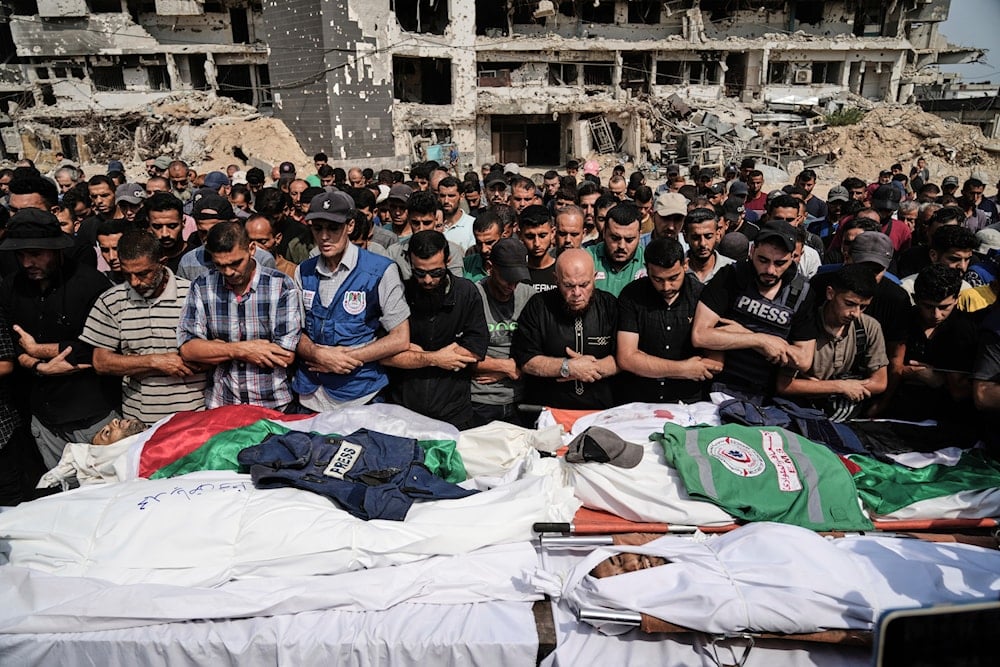200 news outlets demand an end to killing of journalists in Gaza
Nearly 200 media outlets join a global protest condemning the killing of journalists in Gaza and "Israel’s" ongoing ban on foreign press access.
-

Palestinians pray over the bodies of journalists, including Al Jazeera correspondents Anas al-Sharif and Mohamed Qreiqeh, who were killed in an Israeli airstrike, during their funeral outside Gaza City's Shifa hospital complex, on September 11, 2025. (AP photo)
Almost 200 media organizations across 50 countries have launched an unprecedented global protest demanding an end to the killing of journalists in Gaza and calling for unrestricted international media access to the besieged enclave.
Coordinated by Reporters Without Borders (RSF), the action includes blacked-out front pages, homepage banners, and broadcast interruptions under the stark message: "At the rate journalists are being killed in Gaza by the Israeli army, there will soon be no one left to keep you informed."
The initiative is part of the RSF Gaza campaign and is being supported by Avaaz and the International Federation of Journalists (IFJ). It began on September 1 and marks one of the most unified global media blackout protests in recent history.
Since October 7, 2023, over 210 journalists have been killed in Gaza, making it the deadliest war for reporters in modern times. Many of them were Palestinian reporters working under fire, with no possibility of retreat or external support.
On August 25, Israeli forces bombed the al-Nasser medical complex in Gaza, a known media hub, killing five journalists, including staff from Reuters and the Associated Press (AP). Two weeks earlier, six other journalists were killed in a single strike, including Al Jazeera correspondent Anas al-Sharif.
RSF: This is a war on journalism
Thibaut Bruttin, Director General of the RSF, described the situation as nothing short of a systemic assault on journalism: "This is not only a war on Gaza, it is a war on journalism itself. Journalists are being killed, they are being targeted, they are being defamed. Without them, who will speak of famine, who will expose war crimes, who will denounce genocides?"
The protest also highlights the fact that foreign media have been barred from entering Gaza for nearly two years, forcing Palestinian journalists to shoulder the burden of reporting amid daily bombardments.
This press blackout enforced by the Israeli regime has fueled growing concerns over accountability and transparency, as the world relies solely on local journalists for coverage of the humanitarian catastrophe.
Andrew Legon, campaign director at Avaaz, warned of the consequences: "It is very clear that Gaza is being turned into a graveyard for journalists for a reason. The far-right Israeli government is trying to finish the job in the dark, without the scrutiny of the press. If the last witnesses are silenced, the killing won't stop; it will simply go unseen."
Moreover, the International Federation of Journalists (IFJ) is calling for a UN International Convention on the safety and independence of journalists. IFJ General Secretary Anthony Bellanger emphasized the toll on the global press community:
"Every journalist killed in Gaza was someone’s colleague, friend, or family. They risked everything to tell the world the truth, and they paid with their lives. The public's right to know has been deeply damaged as a result of this war."
Read next: 'Israel' deliberately targets Gaza journalists to hide crimes: Report

 3 Min Read
3 Min Read








